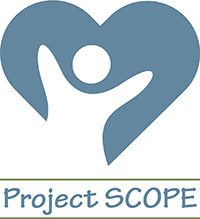Project SCOPE National Training Initiative Launches Initial Cohort
February 26, 2020

|
| Project SCOPE logo: A person silhouette inside of a heart |
Eight University Centers for Excellence in Developmental Disabilities and Leadership Education in Neurodevelopmental Disabilities from nine states have been accepted into the initial cohort of a new national training initiative entitled Project SCOPE: Supporting Children of the OPioid Epidemic. Project SCOPE addresses neonatal abstinence syndrome (NAS) and neonatal opioid withdrawal syndrome (NOWS).
The Project SCOPE pilot was developed in 2018 by the Wyoming Institute for Disabilities, in partnership with the Nisonger Center at The Ohio State University and the University of Cincinnati Center for Excellence in Developmental Disabilities. Project SCOPE uses the Project ECHOTM virtual professional development model. Training focused on the impact of childhood trauma, medication assisted treatment for addiction, developmental outcomes, family supports and service coordination. Training participants included special educators, early interventionists, social workers, physicians, psychologists, nurses, administrators, foster parents and recovering mothers.
Over the next three years, sixteen University Centers for Excellence in Developmental Disabilities (UCEDDs) or Leadership Education in Neurodevelopmental and Related Disabilities (LENDs) serving as primary leads from states that are highly impacted by the opioid crisis will be trained on Project SCOPE. Partners will receive the skills needed to implement this training in their communities and will build an interdisciplinary state team to implement ECHO-SCOPE. Ongoing technical assistance for implementation will be available from the Wyoming Institute for Disabilities.
The spring 2020 cohort includes JFK Partners from the University of Colorado; Georgia State University Center for Leadership in Disability; University of Kentucky Human Development Institute; Institute on Community Integration from the University of Minnesota; New Hampshire Institute on Disability from the University of New Hampshire and Maine Center for Community Inclusion and Disability Studies from the University of Maine; Rose F. Kennedy Children's Evaluation and Rehabilitation Center at Montefiore, New York from the Albert Einstein College of Medicine; North Dakota Center for Persons with Disabilities from Minot State University; University of South Dakota Center for Disabilities; and Utah Center for Persons with Disabilities from Utah State University.
The Nisonger Center and the University of Cincinnati UCEDDs have provided the curriculum that includes current research on brain development, developmental outcomes of prenatal exposure to opioid and other substances, trauma informed care, provider secondary trauma stress, and strategies to support caregivers. WIND has developed an ECHO model network to implement this curriculum.
This Office of Intellectual and Developmental Disabilities project also reflects an exciting collaboration between federal agencies, including the Centers for Disease Control and Prevention, Office of Intellectual and Developmental Disabilities Programs National Training Initiative, Health Resources and Services Administration, Substance Abuse and Mental Health Services Administration, and the U.S. Department of Education.
If you are interested in participating in Cohort II, beginning in October 2020 and continuing through September 2022, applications are due on July 15, 2020. To apply, please visit http://www.uwyo.edu/wind/scope/index.html or contact Canyon Hardesty at [email protected].Betsy Bress
Project Coordinator, Information Dissemination
Wyoming Institute for Disabilities
[email protected] | 307-766-2561







